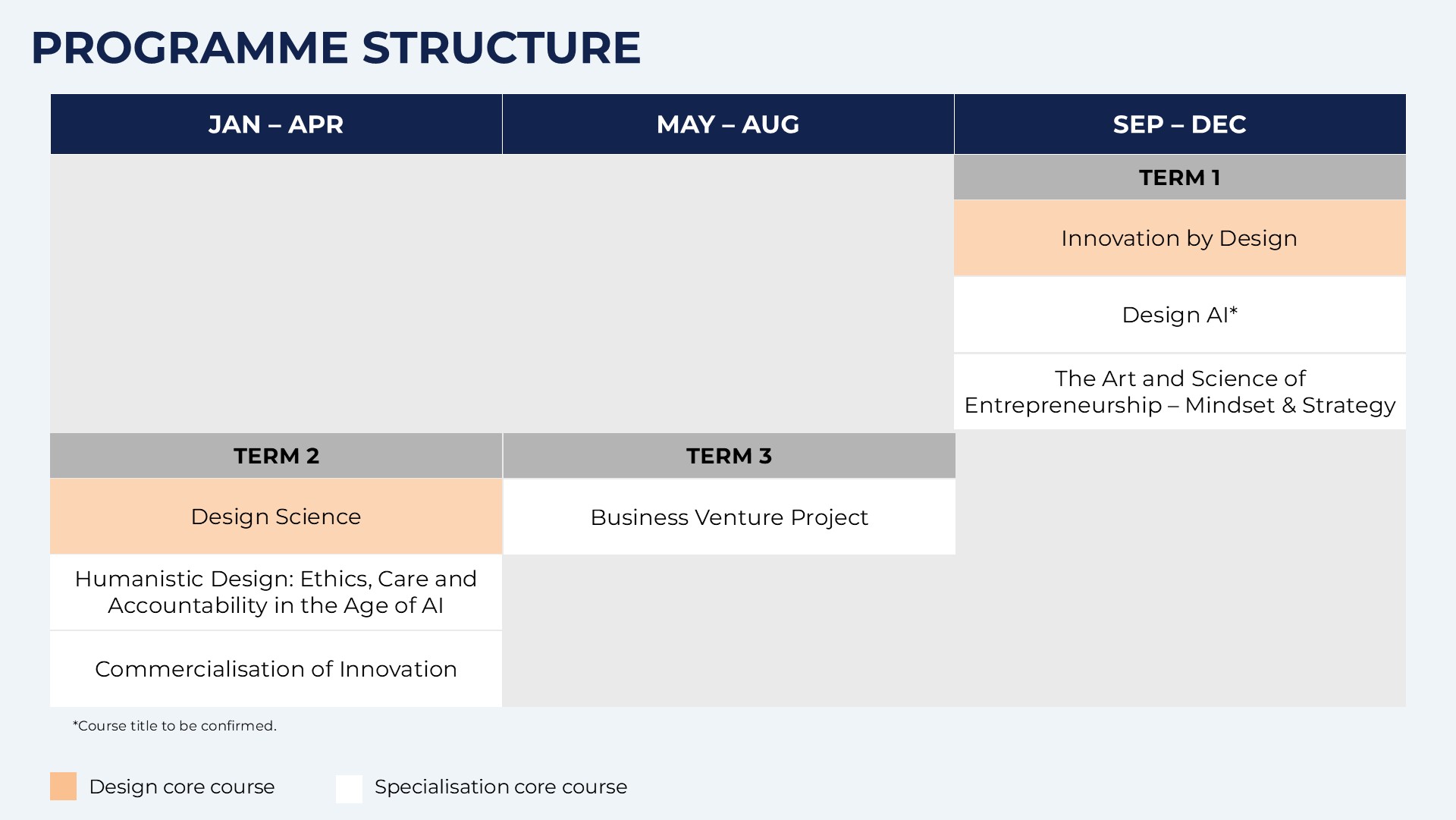Singapore University of Technology and Design (SUTD)
Master of Science in Technology and Design (Human-Centred AI for Venture Innovation)
Programme schedule
The MTD (Human-Centred AI for Venture Innovation) is offered as a one-year full-time coursework-based Master programme. It comprises 7 courses (96 credits)—two core design courses, four specialised courses and one business venture project, organised as follows:
 *Course title to be confirmed.
*Course title to be confirmed.
Course descriptions
Innovation by Design (12 credit points)
The focus of this course is the integration of marketing, design, engineering and manufacturing functions in creating and developing a new product, system or service. The course will go through the different phases of designing a new product, system or service using the four Ds of the four-phase Design Innovation Cycle of “Discover-Define-Develop-Deliver”. The course will focus on some of the critical success factors for new product development, with an early emphasis on design thinking. Students will be given a design challenge to complete.
Design AI (12 credit points)
This course is designed to equip the students with practical strategies to harness design, AI, and technology in addressing real-world challenges. Through interactive and hands-on sessions, the students will also explore the transformative potential of Generative AI – not merely as a tool, but as a collaborative partner in shaping future innovation strategies.
The Art and Science of Entrepreneurship – Mindset & Strategy (12 credit points)
This course provides an introduction to entrepreneurship and innovation, with a focus on the entrepreneurial mindset and the process of new venture creation. Students will develop a strong foundational understanding of entrepreneurship, preparing you to build further skills and deepen your knowledge in related areas. Through practical, experience-based learning, integrating course readings, real-world case studies, and the shared experiences of peers, the course encourages entrepreneurial thinking and equips students to apply these concepts in practice.
Design Science (12 credit points)
This course introduces students to design science where many design principles and methods will be reviewed, applied and analysed. Students will learn to make connections between design science and other fields, such as engineering, and how principles in design science can be used to advance these fields. The class will cover a broad set of design methods such as customer needs analysis, methods in creativity, functional modelling, design for X, and design for testing and verification.
Humanistic Design: Ethics, Care and Accountability in the Age of AI (12 credit points)
This course examines the evolving challenges and responsibilities of leadership in the era of artificial intelligence (AI). Drawing from the adage, “With great power comes great responsibility,” we explore what moral responsibility entails for leaders when AI is part of the decision-making process. What do we mean by a “good” leader? Is it only a matter of efficiency, or does the “good” also involve a specific ethical capability? What obligations do leaders face, and how do their rights and responsibilities change with the integration of AI?
This course will deal with the specific ethical issues arising from a position of leadership in the era of AI, considering not just efficiency but also ethical capabilities, especially in diverse contexts like war, business, and politics. We will look at connected themes, such as authority, power, governance, and technology, to address how leaders’ rights and responsibilities evolve with AI implementation and explore key ethical issues leaders face today.
Commercialisation of Innovation (12 credit points)
This course provides a comprehensive guide for students to understand and navigate the process of transforming technological innovations into viable products and services. It is designed for aspiring entrepreneurs, innovators and professionals who seek to transform ideas and intellectual property into real-world impact through strategic commercialisation. The curriculum covers the full spectrum from ideation to market entry, with a strong emphasis on patent strategy, product design and venture creation.
By the end of the course, students will be equipped with the analytical tools, strategic frameworks and practical know-how to launch innovations successfully and build long-term value through strategic use of intellectual property.
Business Venture Project (24 credit points)
The Business Venture Project takes place in the final term as the capstone of the programme, giving students the opportunity to apply their learning to the design and development of a real-world start-up. Working individually or in teams, students refine their ideas into prototypes and pitch them to a panel of potential investors and venture capitalists, with the opportunity to secure seed funding or investment support. This immersive experience sharpens entrepreneurial skills and prepares students to transform innovation into viable, market-ready ventures.
